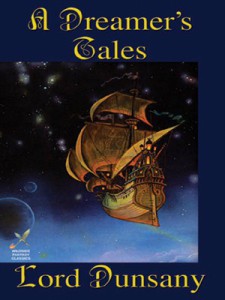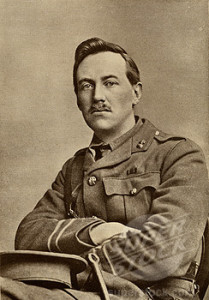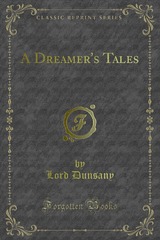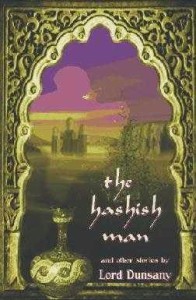Lord Dunsany Re-Read: A Dreamer’s Tales, Part 5
 This Friday brings us the fifth installment of our read through of a Lord Dunsany short story collection, A Dreamer’s Tales. My friends Bill Ward and C.S.E. Cooney have joined me once again to share thoughts. You can join in too — this book’s stories not only are quite short, they’re freely available as a Kindle download or through Project Gutenberg. It won’t take very long to catch up if you haven’t read them yet, so you might want to do so before you read any further.
This Friday brings us the fifth installment of our read through of a Lord Dunsany short story collection, A Dreamer’s Tales. My friends Bill Ward and C.S.E. Cooney have joined me once again to share thoughts. You can join in too — this book’s stories not only are quite short, they’re freely available as a Kindle download or through Project Gutenberg. It won’t take very long to catch up if you haven’t read them yet, so you might want to do so before you read any further.
This week we tackled the three final stories of the collection, “The Field,” “The Day of the Poll,” and “The Unhappy Body.” We have a pretty simple review scale. One star is a standout and two stars is truly great.
My favorite this time is “The Unhappy Body.” Though it is dark and sad, I find it holds great power even upon revisitation, and I award it a star. Given that Bill and Claire quote most of my favorite bits below, I’ll forego quotations this time myself.I’m torn about “The Field.” In some ways this one reminds me of a good Twilight Zone episode with a sting at the end you don’t see coming. It’s hard, of course, to enjoy the episode again once you’ve already been stung, and I found on revisiting that it seemed a trifle long even as short as it was… although was that simply because I KNEW how it was going to end? I’m not sure I can evaluate it fairly, now.
 I don’t have particularly strong feelings about “The Day of the Poll” except that I found the narrator’s friend, the poet, more irritating than delightful. The story’s a good sendup of political troubles and all politicians, surely, with some pretty astute observations, but it rubbed me the wrong way because I feel so strongly that every person should vote. I kind of wanted karate chop the poet so the voter could go express his opinion.
I don’t have particularly strong feelings about “The Day of the Poll” except that I found the narrator’s friend, the poet, more irritating than delightful. The story’s a good sendup of political troubles and all politicians, surely, with some pretty astute observations, but it rubbed me the wrong way because I feel so strongly that every person should vote. I kind of wanted karate chop the poet so the voter could go express his opinion.
Bill, what was your take?
Bill: “The Field” *: Arthur C. Clarke’s Childhood’s End first acquainted me with the notion that the future could somehow resonate within the present and past — in that book, which I won’t spoil the surprise of, there was something so traumatic to the human race that it rebounded into the past to influence our collective subconscious. Clarke said something about quantum theory to prop up this this very poetic idea, but Dunsany goes straight to the heart of it when it is only a poet that can discern just what the narrator of “The Field” finds so unsettling about a particular spot of ground just outside London. We are told nothing of significance has ever happened in this quiet spot, and so, when in the last line of the tale the poet identifies the place as a battlefield, we know that the horrors of that war are still to come. It gets a star for the cool idea and the execution, though I agree it felt a bit long.
“The Day of the Poll”: Again we have the poet as a man apart, someone aloof from common concerns. When the entire town “went mad” with election fever, the poet removes one townsmen from that environment and shows him some of the beauty in the world outside of the beehive of human society. Politics is portrayed as petty, a herd instinct, the losing candidate’s failure a foregone conclusion because he “had neglected to subscribe to a single football club.” I can well imagine the hypothetical criticism of aristocratic Dunsany scoffing at the lower classes, but that’s a failure to understand what he’s saying. We all get wrapped up in such concerns to varying or lesser degrees, but few people have the perspective to put them in proper context for long. I have to say I can relate to Dunsany’s poet when I see people so eager to separate themselves into partisan ranks, or so consumed with some sort of group identity. I’m with you, Howard, in believing everyone should vote, and that thought does diminish the story for me somewhat, but I don’t see how this premise for a story would make sense if it was a non-political activity, either. I certainly don’t read it as anti-political though.
 “The Unhappy Body” *: The dialog between body and soul in this story is reminiscent of that between the soul of the suicide and the rope in “Blagdaross.” This soul is “tyrannous,” full of dreaming and an urge to dream, and to write those dreams. Was Dunsany ever so weary as this? Certainly he understood the urge that drives the artist, the soul that seems a separate thing and hungers after work for which there “is no reward.” In the end, the body does get its eternal rest, and the soul is off to dream some more. I think the sadness is tinged with a bit of a tongue and cheek self-awareness, I feel as if Dunsany would have agreed with the soul’s outrageous demands and that the body should know its place. The soul getting what it wants, right up to the last minute when the body finally calls quits, seems like the victory of a life well-lived.
“The Unhappy Body” *: The dialog between body and soul in this story is reminiscent of that between the soul of the suicide and the rope in “Blagdaross.” This soul is “tyrannous,” full of dreaming and an urge to dream, and to write those dreams. Was Dunsany ever so weary as this? Certainly he understood the urge that drives the artist, the soul that seems a separate thing and hungers after work for which there “is no reward.” In the end, the body does get its eternal rest, and the soul is off to dream some more. I think the sadness is tinged with a bit of a tongue and cheek self-awareness, I feel as if Dunsany would have agreed with the soul’s outrageous demands and that the body should know its place. The soul getting what it wants, right up to the last minute when the body finally calls quits, seems like the victory of a life well-lived.
Claire, what did you think of these three?
Claire: I give “The Field” a star too, first because “upland behind upland in the twilight” gave me a thrill in the first paragraph; second, because the phrase “long ago, when the elf-kings still had horns” made me want to write at least THREE NOVELS; third, because suddenly all the pretty fairy mists and hills turned into a creeping nightmare, and HOW DID HE DO THAT?; fourth, because the slamming shut of the book, or the abrupt awakening from that nightmare at the end, gave me an adrenalin jolt equivalent to that time when my little brother was watching the movie “Arachnophobia” and I crept up behind him and tickled the back of his neck, and he jumped about six feet. That was so great. So was the effect of Dunsany’s last line. Since it was my first time reading “The Field” I cannot speak to Howard’s complaint that the second time through the story loses its punch and dazzle, but it was my first time, and I’m basking in a sense of awed admiration. And that’s okay, I think.
 “The Day of the Poll…” Meh. I liked that in the midst of the sad poet’s pretty reflections the whole town was raving mad. But this story was more about matters of taste than truth, and when a story is about taste, I like it to be fair. I like to see both sides, and judge them by their behavior, and get to decide for myself who or who is not raving mad. Those stories are best when I finish them upset and ambiguous. This one was so judgmental. Poetry is good; politics are bad. But one could easily rewrite this story from a reformer’s perspective, in which the narrator is one of your mild-eyed, soft-spoken kidnapping-and-brainwashing types. Great changes are happening in the country, and this wispy dude just removed a crucial voter to study thorn bushes and reminisce about ages past. What the heck? Anyway. It kind of infuriated me. That is, if I could bring myself to care enough to feel fury, which is less what happened upon reading the story and more what is happening now, reflecting upon it.
“The Day of the Poll…” Meh. I liked that in the midst of the sad poet’s pretty reflections the whole town was raving mad. But this story was more about matters of taste than truth, and when a story is about taste, I like it to be fair. I like to see both sides, and judge them by their behavior, and get to decide for myself who or who is not raving mad. Those stories are best when I finish them upset and ambiguous. This one was so judgmental. Poetry is good; politics are bad. But one could easily rewrite this story from a reformer’s perspective, in which the narrator is one of your mild-eyed, soft-spoken kidnapping-and-brainwashing types. Great changes are happening in the country, and this wispy dude just removed a crucial voter to study thorn bushes and reminisce about ages past. What the heck? Anyway. It kind of infuriated me. That is, if I could bring myself to care enough to feel fury, which is less what happened upon reading the story and more what is happening now, reflecting upon it.
“The Unhappy Body.” I’m sure you gentlemen noticed that this is the last story of the book. Don’t you find that significant? Especially given the nature of the story, and the plaintive tranquility in the last line. I love what Bill said, “Was Dunsany ever so weary as this?” I love that. It is as if the author has exhausted himself giving us “A Dreamer’s Tales” and now death would be preferable to any such further endeavor. I’m not much for the, hmn, whining nature of the story, but it has that great paragraph wherein the Body says, “I am united with a fierce and violent soul, that is altogether tyrannous and will not let me rest, and he drags me away from the dances of my kin to make me toil at his detestable work…” It goes on from there. It is MAGNIFICENT. It was my first Facebook update of the day. I like the thought that this was as much a tongue-in-cheek self-reflection as it was a lamentation from the bowels of the author’s being, but I had trouble seeing the humor in it, if it was there. But then, I was never very sharp on the uptake where satire was concerned. It was a great choice to end a collection with; for that, and for the righteous artist’s monologue, A STAR.
Howard: That’s all for this week, and the end of the book. Next week we’ll look back and discuss our favorites and decide whether or not we wish to continue on.
2 Comments